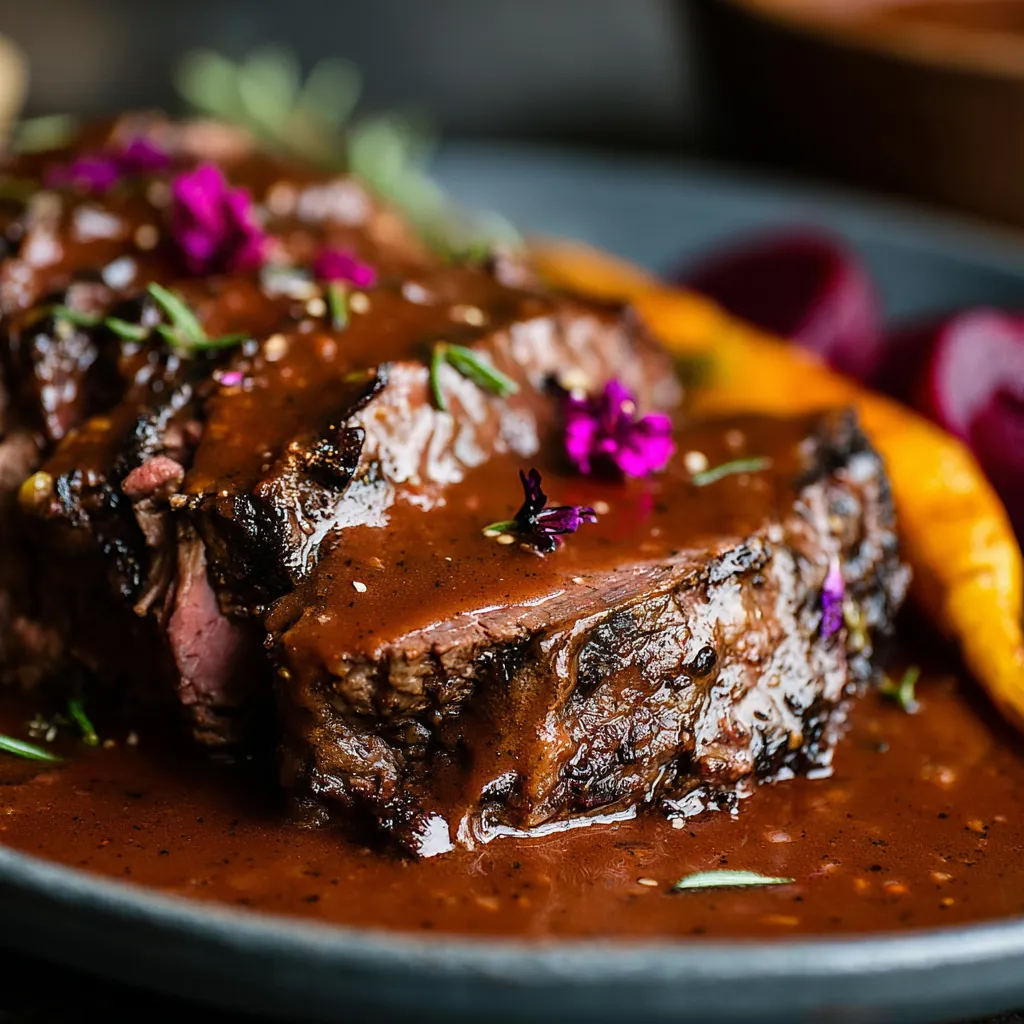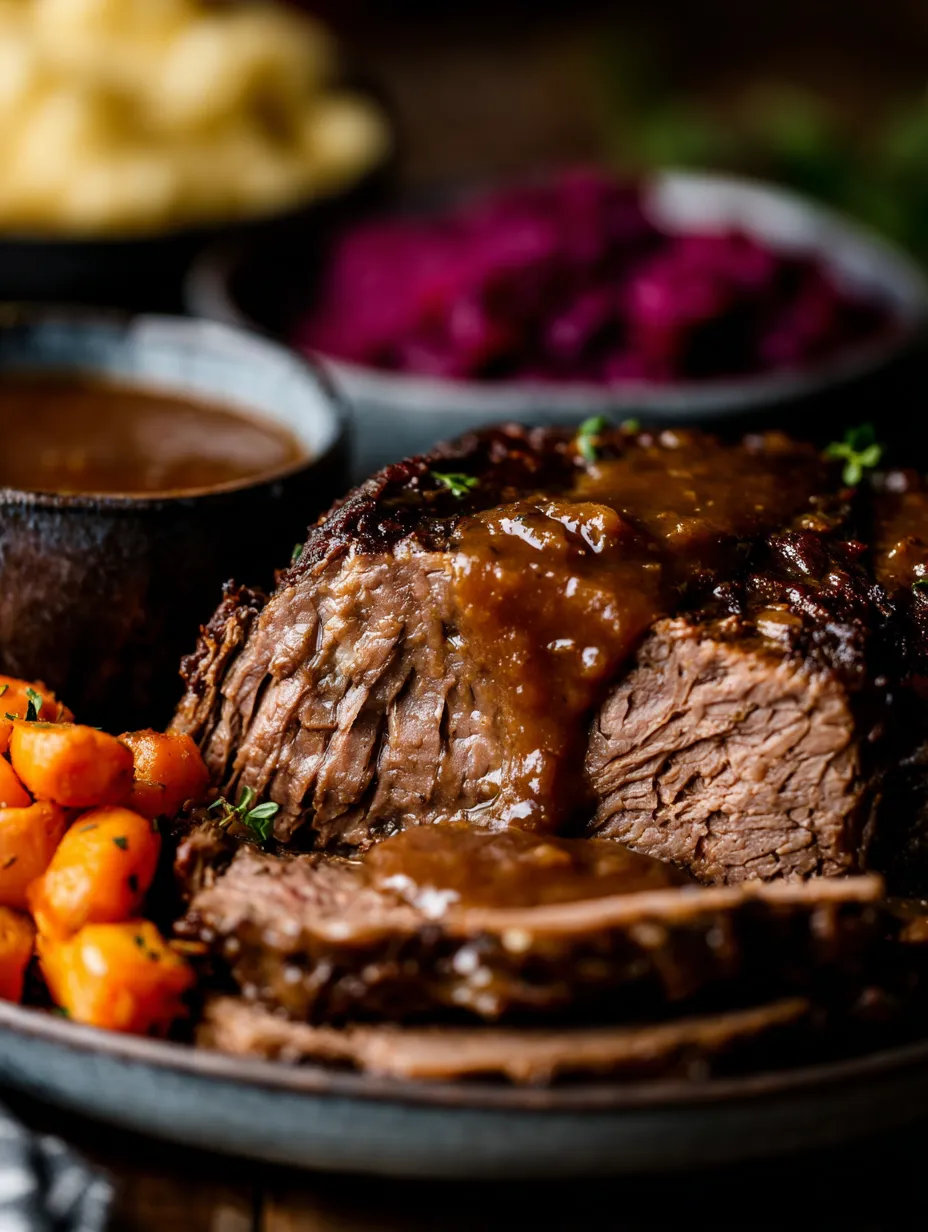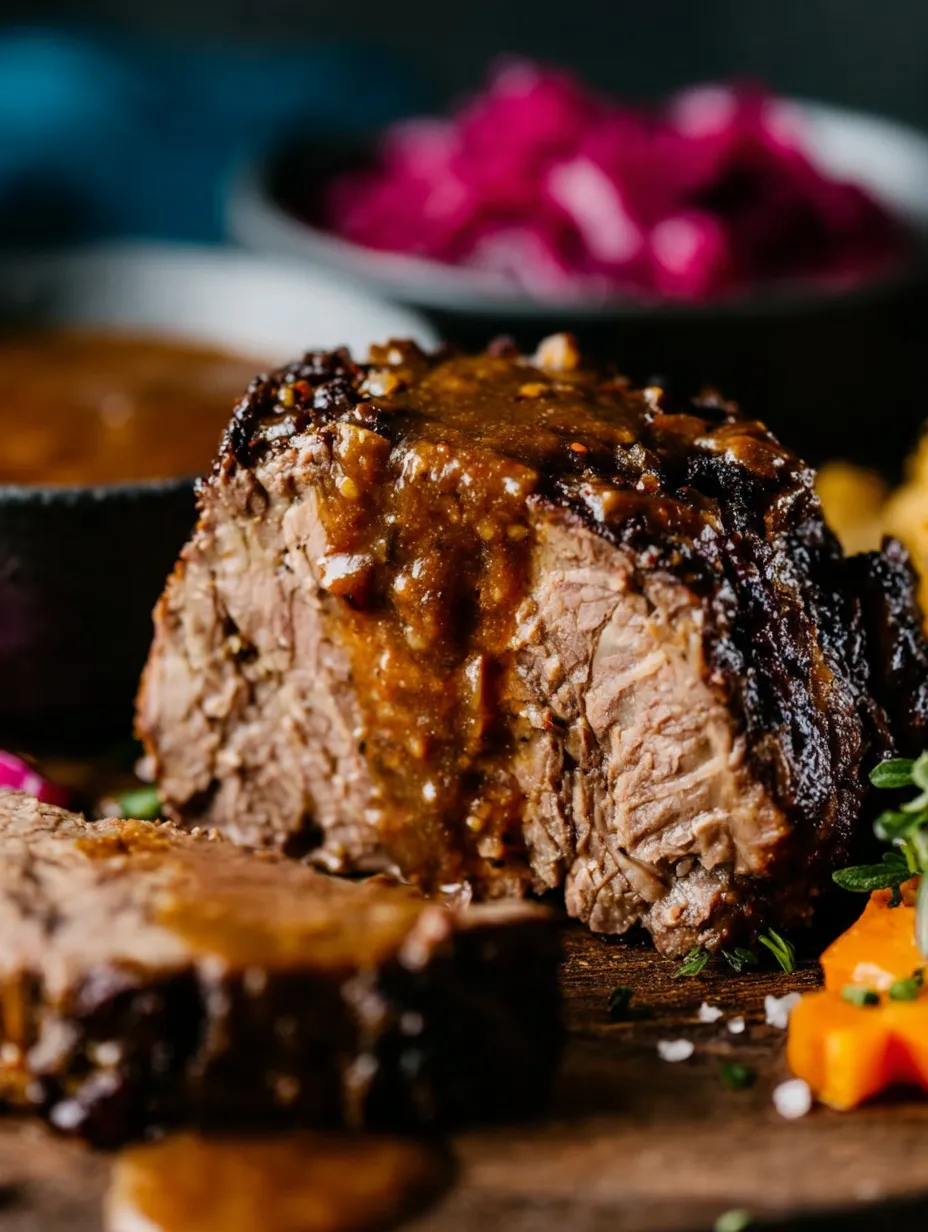 Save
Save
Sauerbraten is the ultimate German comfort food a deeply marinated beef roast cooked until fork tender then finished with a rich sweet-sour gravy. It is the kind of dish that fills a home with the best cozy scents and brings everyone around the table for a memorable meal.
My family fell in love with sauerbraten after our first visit to Bavaria and now I always look forward to the ritual of turning the roast in its marinade each day anticipation growing for the first warm bite.
Ingredients
- Beef roast: look for top round or bottom round for the most tender results choose a roast with good marbling for flavor
- Red wine: use a dry style for a more pronounced flavor avoid sweet wines for the marinade
- Red wine vinegar: this brings tang and balances the richness be sure it is fresh and aromatic
- Water: you can swap in bone broth or stock for extra flavor
- Yellow onions: large and fresh for best flavor and texture thinly sliced for marinade diced for cooking
- Whole peppercorns: crush slightly to release their oils black peppercorns are ideal
- Juniper berries: rare but essential for authentic aroma gently crushed before adding
- Bay leaves: should be flexible and fragrant for a bright herbal note
- Lard or oil: for browning the roast and aromatics choose a high heat neutral fat
- Carrots and celery: go for crisp and sweet vegetables dice evenly for even sautéing
- Flour: for thickening the sauce plain all-purpose is best
- Gingersnap cookies: provide the sweet spicy base for the gravy authentic German brands give the most depth you can also use honeycake or raisins in a pinch
Step-by-Step Instructions
- Marinate the Beef:
- Pat the beef roast dry and sprinkle it with salt. Place it in a deep nonreactive container or extra strong resealable bag. Combine the wine vinegar water sliced onion bay leaves crushed peppercorns and juniper berries. Pour the mixture over the beef making sure at least half is submerged. Cover tightly and refrigerate for a minimum of three days turning the roast over once or twice a day to ensure even flavor.
- Sear the Roast:
- Remove the beef from the marinade and dry it thoroughly with paper towels. Strain the marinade reserving the liquid. In a heavy lidded pot melt the lard or oil over medium high heat. Brown the beef on all sides for about fifteen minutes developing a deep crust. This caramelization builds the backbone of the final flavor.
- Sauté the Vegetables:
- Use the fat left in the pot to cook the diced onions carrots and celery. Stir frequently over medium heat until the vegetables are soft and beginning to brown about seven minutes. This step draws out the natural sweetness and forms the vegetable base for the sauce.
- Make the Sauce Base:
- Sprinkle in the flour and stir for several more minutes until the flour loses its raw smell and gains a little color. Add the reserved marinade liquid plus a bit of water and stir well. Let the mixture come to a boil then return the browned meat to the pot. Cover tightly and reduce to a low simmer. Cook for two hours until the beef is tender and gives way easily when pierced.
- Finish the Gravy:
- Transfer the meat to a warm plate and cover. Raise the heat under the pot and bring the sauce to a brisk bubble. Add the finely crushed gingersnap cookies stirring well so they dissolve fully and thicken the gravy. Simmer gently for ten minutes stirring frequently so nothing sticks. Use an immersion blender or press through a fine sieve for an ultra smooth gravy. Taste and adjust with a splash more vinegar or salt to balance as needed.
- Slice and Serve:
- Cut the roast into thin slices about quarter inch thick. Smother with plenty of the rich sauce. Serve with classic sides like potato dumplings or red cabbage for the full German experience.

I always look forward to dropping in the gingersnap cookies at the end my favorite step because the kitchen instantly fills with that spicy sweet aroma it is the secret behind the sauce’s lush velvet texture and complex flavor. My grandmother used to sneak me a cookie when I helped her cook and I still feel a little mischievous adding them now.
Storage Tips
Let the roast and gravy cool to room temperature before storing. Place in a sealed container and refrigerate for up to four days. Slice beef and freeze with gravy in individual portions for up to three months for easy weeknight meals. Always reheat gently in a saucepan with a splash of water or broth to keep everything moist and avoid drying out the beef.
Ingredient Substitutions
If you do not have juniper berries you can swap in a few whole allspice berries or double the bay leaves for a different kind of fragrance. Bone broth or stock makes a richer marinade base than water especially if you have homemade beef stock on hand. If you are gluten free swap the flour for cornstarch and use gluten free ginger cookies instead of regular for the thickener.
Serving Suggestions
Traditional sides are potato dumplings spaetzle egg noodles or bakery fresh rye bread to mop up every last bit of gravy. Braised red cabbage and apples lend a sweet tangy counterpoint while oven roasted root vegetables work beautifully with the sauce. I love serving this at holidays or Sunday dinners as an old world centerpiece with sides that encourage lingering and second helpings.

Cultural Context
Sauerbraten has roots across Germany and every region claims a slightly different marinade or sweetener. Some families add raisins or apple cider others prefer pumpernickel bread as a thickener. No matter the version the dish is always about slow marinating and patient simmering for layers of flavor born of tradition. It is the kind of dish that is as cozy in a modern kitchen as it was in castles or farmhouses centuries ago.
Recipe FAQs
- → How long should the beef marinate for best flavor?
Marinating the beef for at least three days, turning it occasionally, allows the meat to absorb the tart and aromatic notes. Extending to five days enhances tenderness and depth.
- → What cut of beef works best?
Top or bottom round roast is traditional, but other tough cuts like chuck roast may also be used since the marinade and slow cooking ensure tenderness.
- → Can I substitute any marinade ingredients?
You can use bone broth or stock in place of water for richer flavor. Honeycake or raisins work as alternatives to gingersnaps for sweetening and thickening the gravy.
- → What are the best serving accompaniments?
Red cabbage, potato dumplings, and buttered noodles are classic partners. The tangy gravy complements hearty, starchy sides beautifully.
- → How can leftovers be stored and reheated?
Cool completely before transferring to airtight containers. Refrigerate for up to four days or freeze for three months. Reheat gently on the stovetop or covered in the oven.
